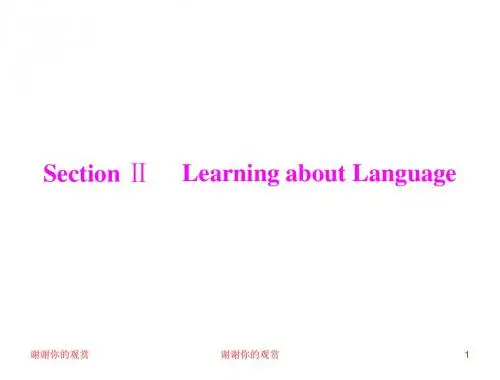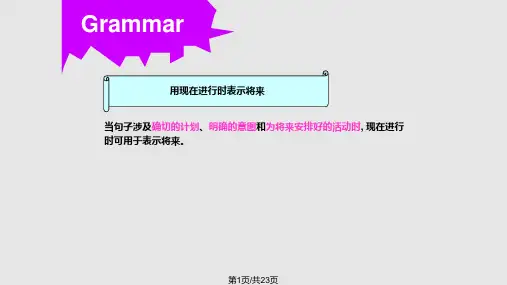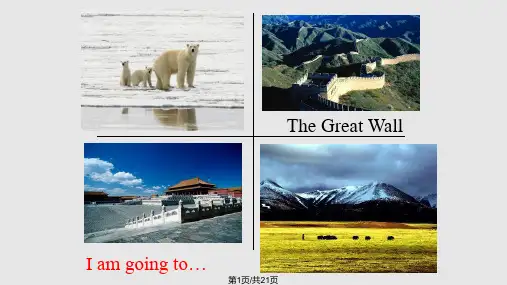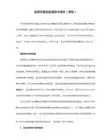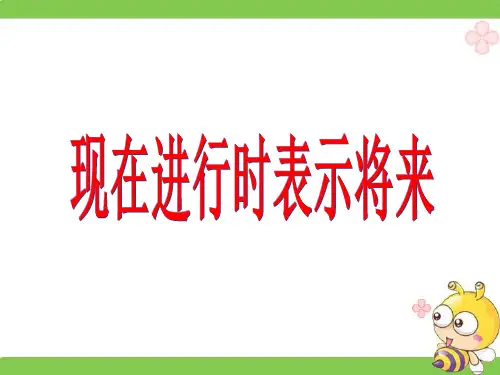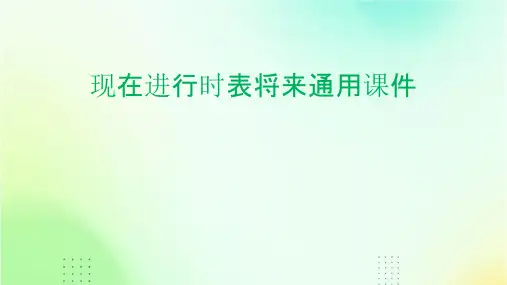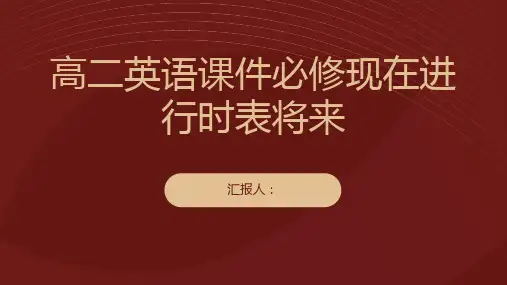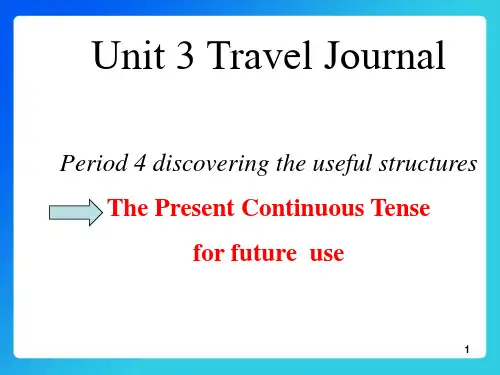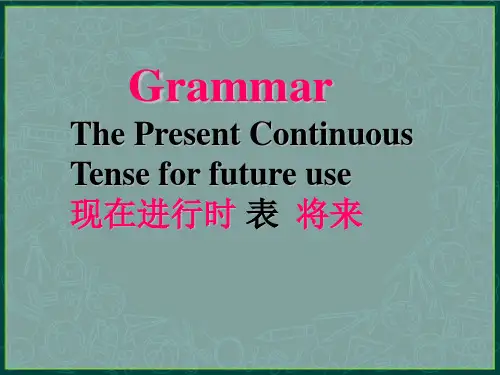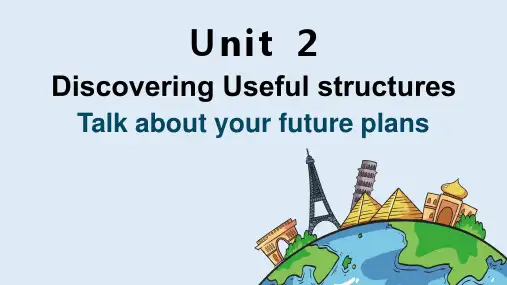- 1、下载文档前请自行甄别文档内容的完整性,平台不提供额外的编辑、内容补充、找答案等附加服务。
- 2、"仅部分预览"的文档,不可在线预览部分如存在完整性等问题,可反馈申请退款(可完整预览的文档不适用该条件!)。
- 3、如文档侵犯您的权益,请联系客服反馈,我们会尽快为您处理(人工客服工作时间:9:00-18:30)。
3) Jane is staying in Xi’an with her parents.
4) Tom is coming with Betty to see her off.
When the Present Continuous Tense is used for the future in the main clause, there is often an indication of time. The action is usually regarded as having been decided upon beforehand. Verbs that are often used in this way are:
The Present Continuous Tense for Future Actions
Step 1
1) Marry is leaving for Beijing by plane tomorrow.
2) Bob is going to the airport by taxi next week.
In the future, people will perhaps go shopping with electronic money.
shopping
Practice
Action Past Present
Future
Travel Horse Car/ Plane Spaceship
Scrolls, paper Reading made from bamboo
e.g. We shall not go out for a hike if it rains tomorrow.
• If,when,until,after,before引导的时间或者条件从句用现在时 表示未来
• I’ll let you know if he comes. • We won’t begin until you are ready. • 限定性从句(名词性)用现在时表示未来 • Any decision that you make will need her approval. • We insisted the plan that he be our part.
newpaper.
reading
Past
Present
Future
brush
pen
In the past, people used to write with brush.
computer
Today most people write with pen.
In the future, people will perhaps write with a computer.
现在进行时表示将来动作:
go, come, leave, get, arrive, meet, see off, take off, return, start, fly, stay(英语中称为 位移动词)
e.g. 1. I’m leaving at seven tonight . 2. The plane is taking off in a few minutes . 3. The car is coming .
Step 3
The present tense is used for the future in a clause introduced by “when”, “if”, “before”, “till/until”, “every time”, “by the time”, “as soon as”, “the moment”.
When the plane, the train, the bus, meeting plan, film and programme are used as the subject, these verbs should be used in simple Present Tense.
e.g. • The plane to London leaves at 9:30 tomorrow morning. • The film begins at 6:00.
Future
horse
plane
space
In the past, people used to travel by horse.
Today most people travel by plane.
In the future, people will perhaps travel by spaceship.
Books Computers
Cellphones, Electronic newspapers
Action Past Present
Future
Writing Simple Pens and Computer pens Computers pens
Shopping Market Shops and Online Supermarket shopping
writing
Past
Present
Future
metal coin
paper money
internet
In the past, people used to go shopping with metal coin.
Today most people go shopping with paper money.
On In offices, Work at Working farms factories hhere are you going? How are you getting to…? Is anybody seeing you off?
Imagine you are Sue, and today is Saturday. Write a letter to Sue’s parents and tell them what you did yesterday, what you are doing now, and what you will do tomorrow. You can use the information in the schedule(日程安排)。
TIPS
Before you start writing, you need to think what you are going to write. List goods ideas and make notes. Think what the readers already know and what they need to know. Consider what you are going to tell them and what you need to explain or give examples of.
the moment等连用。 ② 表示现在阶段正在进行的动作,常与today, this week,
this term等连用。
Now it is the summer vacation and I’m helping my dad on the farm.
现在是暑假,我在农场帮我爸爸干活。 I’m sitting on a rock near the river with my friends. 我和我的朋友们正坐在河边的一块岩石上。
(2)表示反复性或习惯性的动作,常与副 词always, continually等连用,表示说 话人的赞扬,厌恶,不满,遗憾等的 感情色彩。
She’s always changing her mind. 她老是改变主意。(厌烦)
(3) 表示不久之后肯定发生,或按计划、 安排将要做的事,常与未来的时间状语 连用,动词多是表示位移的,如come, go , leave, arrive, start, begin等
② be going to +动词原形。 We’re going to have a party next week. ③ 表示“位移”的词,如arrive, come, go , leave, start,
begin等,可用一般现在时表示将来安排好或即将发生的 事。语气比现在进行时更肯定。 The next train leaves at 9:15.
Step 4
The Present Continuous Tense for the present actions:
1)How are you feeling today? 2)He is always thinking others. 3)You are always leaving things about. 4)He is always talking big.
Dear Mum and Dad,
We arrived at the hotel in Paris yesterday evening. We unpacked our bags there.Then we went to the park and had a picnic.
Now we are playing volleyball. Some are singing songs happily.
3. 我明天将什么东西也不做。 —I a—m—no—t —do—ing—a—ny—th—ing—t—om—or—ro—w.—— 4. 玛丽和我下个星期天去钓鱼。 —M—ar—y a—nd—I—ar—e g—oi—ng—to—fi—sh—ne—xt—S—un—day.
看图写句子
Past
Present
亲切 赞许
厌烦
不满
此四句是现在进行时代替一般现在时, 表示一个经常性重复的动作或状态,这 时句中常带always 或forever,以表示说 话人的某种表情,如赞叹,厌烦,埋怨, 等或强调情况的暂时性使其生动。
